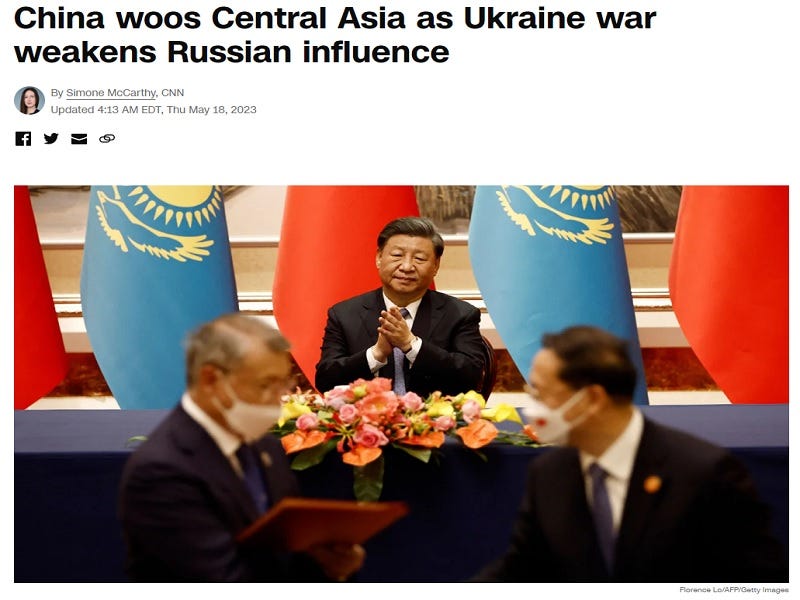It’s equally unlikely that the Sino-Russo Entente will rupture over Central Asia or that China will one day dominate the region, with this assessment being due to their shared multipolar interests but also the economic-security limits to Beijing’s influence.
This week’s first-ever China-Central Asia Summit prompted the Western media to once again fearmonger about Beijing’s intentions in that region like what CNN just did in its piece titled “China woos Central Asia as Ukraine war weakens Russian influence”. The innuendo is that the People’s Republic will inevitably dominate these former Soviet Republics, which will lead to Russia either conceding its historical influence there and becoming China’s “junior partner” or those two possibly becoming fierce rivals.
Both of these predictions are wrong for five reasons that will now be explained. First, it’s unrealistic to expect the Sino-Russo Entente to rupture over China’s growing economic influence in Central Asia since these two have proven to be pragmatic enough not to let much more significant differences over competing Chinese-Indian claims in the Himalayas impede their cooperation on jointly accelerating the global systemic transition to multipolarity.
Second, the expansion of Chinese economic influence in those five countries between it and Russia doesn’t automatically equate to the expansion of security influence. The People’s Republic has comparatively little anti-terrorist and conventional military experience compared to Russia, which is the region’s traditional security partner. This therefore makes it unlikely that they’d ever ditch Moscow for Beijing as their preferred partner in this sphere.
Third, Central Asia has a history of anti-Chinese riots that were driven by concerns about its growing economic influence, but which could easily be weaponized by agenda-driven actors (whether domestic radicals or foreign meddlers like the US) to add an ethnic and/or religious angle to such unrest. This sensitive observation suggests that there are limits to how far and fast China’s sway can expand before experiencing serious pushback, both genuinely grassroots and artificially manufactured.
Fourth, Russia and China aren’t the only multipolar players active in Central Asia since their shared BRICS and SCO Indian partner also regards it as a priority region as proven by the first India-Central Asia Summit in January 2022. Delhi wants to balance Beijing’s rising influence there, to which end it’s expanding economic and security cooperation, the first via the North-South Transport Corridor (NSTC) and the second regarding the sharing of its tried-and-tested multidimensional security experiences.
The preceding four points lead to the final one regarding the Indian-Russian interplay in Central Asia aimed at helping one another balance China there in a friendly, gentle, and non-hostile way. If Moscow ever became concerned that the region was “drifting” away from it, whether on its own for whatever reason or due to Washington’s meddling, then it could seek to manage this development by maximally opening the doors for Delhi there in an attempt to maintain those states’ balancing acts vis-à-vis China.
To sum it up, it’s equally unlikely that the Sino-Russo Entente will rupture over Central Asia or that China will one day dominate the region, with this assessment being due to their shared multipolar interests but also the economic-security limits to Beijing’s influence. In the event that the People’s Republic somehow or another appears poised to become Central Asia’s primary partner, then Russia could rely on India to counterbalance China in a friendly, gentle, and non-hostile way that avoids triggering a security dilemma.





"...it’s [equally] unlikely that the Sino-Russo Entente will rupture over Central Asia..."
Yeah, but when zero-sum games are your forte...
People in glass houses lob stones at those in brick ones on the off-chance they might hit a window.
Or, as the Chief Administrator of the Nobel Prize Winning Administration once so eloquently and cleverly said (Such masterful wit!): 'When the biggest and best tool in your toolbox is a hammer, and it's bigger and better than anyone else's, every problem looks like nail.' (or something like that)
That was when the Russian economy, apparently, had been reduced to 'tadders', (or somewhere around about then) if you remember; Russia was going to be defeated for the want of Parmesan cheese. Remember?
I bet they remember in Central Asia.